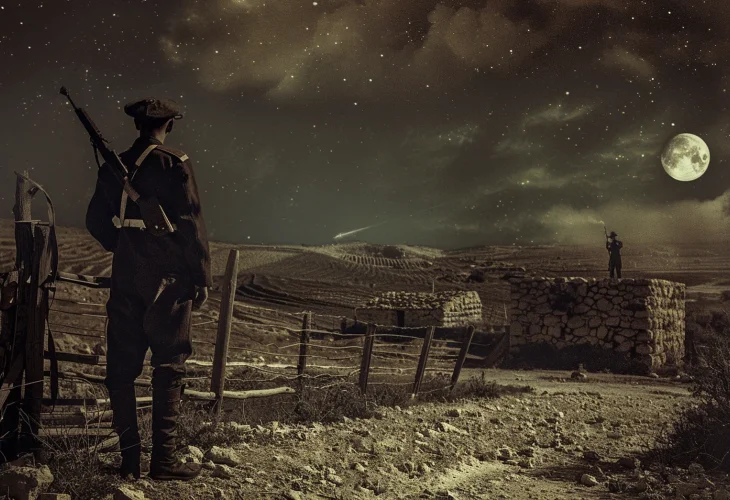History and Archaeology
The Tragic Secret of Abraham Joseph Beharal
The first fallen guard of Hashomer and the painful truth revealed decades later

In 1908, the great Hebrew writer and poet Chaim Nachman Bialik visited the young settlement of Hadera. In his honor, the workers of the colony organized a parade and sang a well-known Zionist song. Yet not everyone agreed with the choice. Some farmers felt that such a political song was not appropriate for the moment and tried to sing a different one. Voices clashed, one poet shouted, another pushed, and the grand reception turned into a noisy scuffle.
Then, from the crowd, a thin but piercing voice rose in song. It was an old Hasidic melody: Nafshi Elecha Ekra—“My soul calls out to You.” The voice grew stronger, and soon the fighting voices faded. All eyes turned to a slender Hasidic young man, his eyes closed as he sang with deep emotion. Slowly, the crowd began to dance around him, their anger dissolving into joy. When the atmosphere calmed, Bialik himself rose to speak and remarked, “May we merit that all of Israel unites around its song, as it united today around the song of this Hasid.”
The singer was a young man named Abraham Joseph Beharal.
The Beharal family were descendants of the righteous Rabbi Leib ben Sarah, and from him came their name “Ben Harav Rabbi Leib.” Abraham Joseph was born in Volhynia, where his family had long been known as cantors and ritual slaughterers. He himself was a gifted cantor, studied shechita (Jewish ritual slaughter), and was ordained as a rabbi. But more than that, he was a fiery Hasid, full of joy, music, and dance, never missing a chance to sing or celebrate with others.
He came to the Land of Israel with the dream of fulfilling the mitzvah of yishuv ha’aretz, settling the Land. He purchased land in the religious settlement of Hadera, hoping to plant orchards and a flower garden. Once established, he planned to bring his mother, his sisters, and his fiancée to join him.
His inspiring presence at the Bialik reception was noticed by members of Hashomer, the Jewish defense group that had recently formed. “Such a unifying and powerful figure is needed among us,” they said. They immediately invited him to join the guard team of Segera Farm. A man like Abraham Joseph, so full of faith and song, could lift spirits during the long, lonely nights of guarding.
Segera Farm had been established eight years earlier, and later part of its lands became the settlement of Ilaniya, located near the Golani Junction above Tiberias. The area required strong protection, as it bordered the hostile Arab village of Sajr. At first, the settlers relied on Circassian guards, but they proved unreliable. It was here that David Ben-Gurion, then a young worker, pushed for the founding of a Jewish self-defense group. Out of this effort, Hashomer, The Watchman”, was born. Abraham Joseph was among its first members.
On the night of the 24th of Iyar, 1910, Abraham Joseph was assigned to the second shift, from midnight onwards. Instead of resting beforehand, he chose to spend the evening with Hasidic song and dance. But in the middle of the night, a shot rang out. His guard partner, Eliyahu Kaminsky, rushed over, dragging the wounded Abraham Joseph. “Arabs from Sajr shot him,” Kaminsky declared.
There was little the settlers could do. By morning, they placed Abraham Joseph on a cart bound for Tiberias, but by noon he had died. He was only 23 years old. His burial took place in Segera, and his death shocked both the settlement and Hashomer. He became the first casualty of the Jewish defense group.
His mother later arrived in the Land of Israel, wandering from colony to colony, crying out for her son like a brokenhearted mother of Israel. Rabbi Abraham Isaac Kook wrote about him with great admiration: “A charming young man, full of talent, a Torah scholar. He came to the Land of Israel with all the warmth of national love, blood, and soil.” Members of Hashomer swore to avenge his death at the hands of the Arabs of Sajr.
But rumors began to spread. Something about that night didn’t add up. Later, both Hashomer and the Arabs of Sajr announced that the demand for vengeance was dropped. Newspapers printed that Kaminsky had been dismissed from his post “because he was unfit for guarding.”
It was only years later that the tragic truth was revealed: no Arab had fired the shot. Eliyahu Kaminsky had been playing carelessly with his weapon when it discharged, killing his friend. The story about an attack from Sajr had been invented to cover the painful reality. For more than 80 years, the secret was kept, and only 83 years after Abraham Joseph’s death was the truth published.
During Israel’s War of Independence, the inhabitants of Sajr were expelled, and Ilaniya took over their lands. Segera Farm later became a military base, serving the army to this day.

